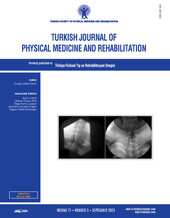The impact of acupuncture therapy combined with breathing training on patients with stroke complicated with pulmonary infection: A prospective randomized controlled study
2 Department of Anesthesiology, The Second Hospital of Hebei Medical University, Hebei, China DOI : 10.5606/tftrd.2025.15201 Objectives: This study aimed to explore the clinical efficacy of acupuncture therapy combined with breathing training in patients with stroke complicated with pulmonary infection.
Patients and methods: In this prospective randomized controlled study, a total of 72 patients with pulmonary infection after stroke who were admitted between May 2020 and May 2021 were randomly divided into the intervention group (n=36; 28 males, 8 females; mean age: 59.9±13.4 years; range, 28 to 80 years) and the control group (n=36; 23 males, 13 females; mean age: 57.8±12.2 years; range, 35 to 79 years). Both groups were treated with conventional drug therapy, rehabilitation therapy, and breathing training for two consecutive weeks. The intervention group additionally received acupuncture therapy. The following data was collected to evaluate clinical efficacy: the traditional Chinese medicine syndrome score and the clinical pulmonary infection score before and after treatment, inflammatory factors, time of symptom disappearance, and pulmonary indexes.
Results: After treatment, the traditional Chinese medicine syndrome score and the clinical pulmonary infection score were significantly lower in the intervention group than in the control group (both p<0.05). The intervention group also experienced earlier fever resolution and faster disappearance of cough, expectoration, and moist rales in the lungs than the control group (all p<0.05). Furthermore, white blood cell count, C-reactive protein, and calcitonin levels were significantly lower in the intervention group than in the control group (all p<0.05). The total effective rates of the intervention group and control group were 94.44% (n=34) and 77.78% (n=28), respectively (chi-squared = 4.181, p=0.041). Additionally, forced vital capacity, forced expiratory volume in the first second, and peak expiratory flow were significantly higher in the intervention group than in the control group (all p<0.05).
Conclusion: Acupuncture therapy combined with breathing training achieved high efficacy in patients with stroke complicated with pulmonary infection. It may improve the symptoms of pulmonary infection and suppress inflammatory responses.
Keywords : Acupuncture therapy, lung infection, inflammatory factors, respiratory training, stroke

















